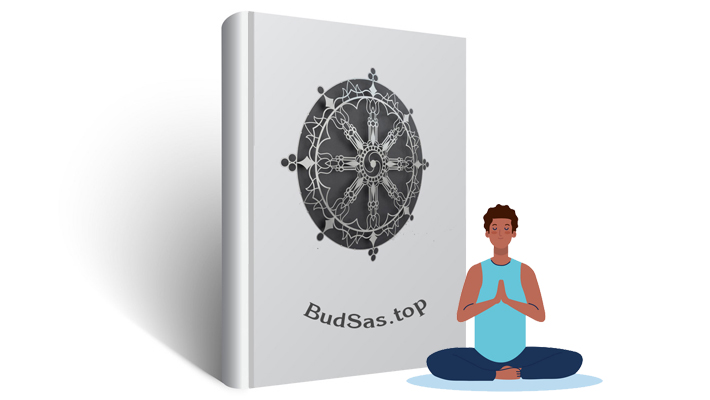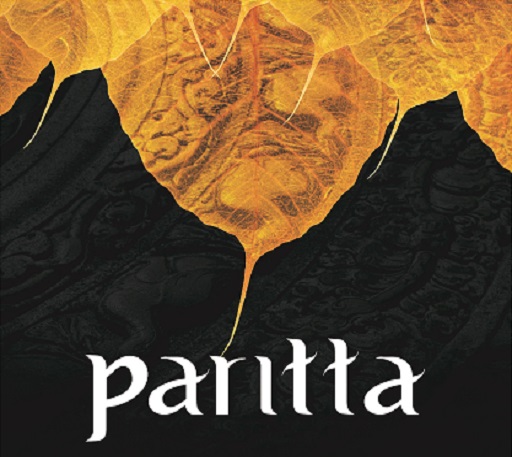No. 154.
URAGA-JĀTAKA.
“Concealed within a stone,” etc.–This story the Master told at Jetavana, about a soldiers’ quarrel.
Tradition tells how two soldiers, in the service of the king of Kosala, of high rank, and great persons at court, no sooner caught sight of one another than they used to fall at ill words. Neither king, nor friends, nor kinsfolk could make them agree.
It happened one day that early in the morning the Master, looking around to see which of his friends were ripe for Release, perceived that these two were ready to enter upon the First Path. Next day he went all alone seeking alms in Sāvatthi, and stopt before the door of one of them, who came out and took the Master’s bowl; then led him within, and offered him a seat. The Master sat, and then enlarged on the profit of cultivating Lovingkindness. When he saw the man’s mind was ready, he declared the Truths. This done, the other was established in the Fruit of the First Path. Seeing this, the Master persuaded him to take the Bowl; then rising he proceeded to the house of the other. Out came the other, and after salutation given, begged the Master to enter, and gave him a seat. He also took the Master’s bowl, and entered along with him. To him the Master lauded the Eleven Blessings of Lovingkindness; and perceiving that his heart was ready, declared the Truths. And this done, he too became established in the Fruit of the First Path.
Thus they were both converted; they confessed their faults one to the other, and asked forgiveness; peaceful and. harmonious, they were at one together. That very same day they ate together in the presence of the Blessed One.
His meal over, the Master returned to the monastery. They both returned with him, bearing a rich present of flowers, scents and perfumes, of ghee, honey, and sugar. The Master, having preached of duty [13] before the Brotherhood, and uttered a Buddha’s admonition, retired to his scented chamber.
Next morning, the Brethren talked the matter over in the Hall of Truth. “Friend,” one would say to another, “our Master subdues the unsubdued.
p. 10
[paragraph continues] Why, here are these two grand persons, who have been quarrelling all this time, and could not be reconciled by the king himself, or friends and kinsfolk: and the Master has humbled them in a single day!” The Master came in, “What are you talking about,” asked he, “as you sit here together?” They told him. Said he, “Brethren, this is not the first time that I have reconciled these two; in bygone ages I reconciled the same two persons.” And he told a story of the olden time.
_____________________________
Once on a time, while Brahmadatta was king of Benares, a great multitude gathered together in Benares to keep festival. Crowds of men and of gods, of serpents, and garuḷas 1, came together to see the meeting.
It so happened that in one spot a Serpent and a Garuḷa were watching the goings-on together. The Serpent, not noticing that this was a Garuḷa beside him, laid a hand on his shoulder. And when the Garuḷa turned and looked round to see whose hand had been laid upon his shoulder, he saw the Serpent. The Serpent looked too, and saw that this was a Garuḷa; and frightened to death, he flew off over the surface of a river. The Garuḷa gave chase, to catch him.
Now the Bodhisatta was a recluse, and lived in a leaf-hut on the river bank. At that time he was trying to keep off the sun’s heat by putting on a wet cloth and doffing his garment of bark; and he was bathing in the river. “I will make this recluse,” thought the Serpent, “the means of saving my life.” Putting off his own proper shape, and assuming the form of a fine jewel, he fixed himself upon the bark garment. The Garuḷa in full pursuit saw where he had gone; but for very reverence he would not touch the garment; so he thus addressed the Bodhisatta:
“Sir, I am hungry. Look at your bark garment:–in it there is a serpent which I desire to eat.” And to make the matter clear, he repeated the first stanza:
[14] “Concealed within a stone this wretched snake
Has taken harbourage for safety’s sake.
And yet, in reverence of your holiness,
Though I am hungry, yet I will not take.”
Standing where he was in the water, the Bodhisatta said the second stanza in praise of the Garuḷa king:
“Live long, preserved by Brahma, though pursued,
And may you never lack for heavenly food.
Do not, in reverence of my holiness,
Do not devour him, though in hungry mood.”
In these words the Bodhisatta expressed his approval, standing there in the water. Then he came out, and put on his bark garment, and took
p. 11
both creatures with him to his hermitage; where he rehearsed the blessings of Lovingkindness until they were both at one. Thenceforward they lived together happily in peace and harmony.
_____________________________
When the Master had ended this discourse, he identified the Birth, saying, “In those days, the two great personages were the Serpent and the Garuḷa, and I myself was the recluse.”
Footnotes
10:1 A mythical bird, which we see is able to assume human form. Morris (J. P. T. S., 1893, p. 26) concludes that the supaṇṇa, here translated Garuḷa, was a “winged man.”

![[PDF] The book of the Discipline – Vinayapiṭaka – The full 6 Volumes](https://en.namo84000.org/wp-content/uploads/2023/12/The-Book-of-the-Discipline-Vinaya-Pitaka.jpg)


![[En] Guide to Tipitaka](https://en.namo84000.org/wp-content/uploads/2021/10/Kinh-Phat-Quan-trong-2.jpg)